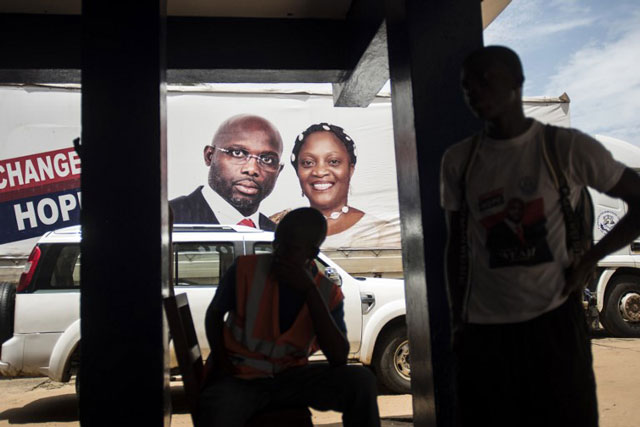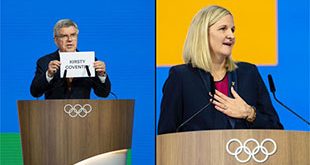
Monrovia, Liberia | AFP | Liberian former international footballer George Weah and Vice-President Joseph Boakai joined voters in casting their ballots on Tuesday as they went head-to-head in a delayed run-off vote for the country’s presidency.
Voters were choosing a successor to President Ellen Johnson Sirleaf, who is stepping down after 12 years as Africa’s first elected female head of state.
Observers warned that turnout appeared to be low in the vote, which aims to achieve the war-torn West African country’s first democratic transition since 1944.
The ballot was delayed for seven weeks due to legal challenges lodged by Boakai’s Unity Party against the electoral commission over the conduct of the first round of voting.
– Football star –
Weah, 51, starred in top-flight European football teams Paris Saint-Germain and AC Milan in the 1990s before playing briefly in England for Chelsea and Manchester City later in his career.
He and Boakai voted in polling stations near their homes in Paynesville, a suburb of Monrovia, the capital of this nation of 4.6 million people.
Both declared victory was theirs for the taking.
“We’re going to win because the people believe in us and they know we represent the best,” said Boakai, a public servant of four decades’ standing.
But Weah was resolute that his second run for the presidency would be successful after 12 years spent building a political reputation to match his popularity.
“Victory is certain. I am sure that I am going to win,” he told journalists after casting his ballot.
– Low turnout –
The choice of December 26 for voting day has proved to be a dampener for turnout in the west African nation, said the European Union’s chief observer Maria Arena, speaking in the early afternoon.
“Turnout seems to be lower than in the first round,” she told AFP.
“We are seeing fewer long lines and less waiting… though we will probably see more people arriving later in the day,” Arena added, as those sleeping off Christmas celebrations headed to vote.
– Previous fraud claims –
Boakai waged a bitter legal battle over problems with queue control and voter identification in the October 10 first round.
On Tuesday polling stations displayed voter lists as a mark of transparency. The EU’s chief observer said staff were “better trained” for the run-off.
Weah alleges that electoral fraud cost him the presidency in 2005 and the vice-presidency in 2011.
His CDC party contested those results but has refrained so far this time, though after voting on Tuesday, Weah warned that “what happened in 2005 and 2011 cannot be repeated”.
Boakai also sounded a cautionary note, saying he would accept the result provided the National Elections Commission (NEC) met “all of the standards”.
Polling stations opened at 8:00 am (0800 GMT) for the country’s 2.1 million voters, and were expected to close at 1800 GMT.
Results are expected in the next few days, according to the electoral commission.
– From pitch to palace? –
Weah topped the first round of voting with 38.4 percent while Boakai came second with 28.8 percent. That triggered a run-off as neither made it past the 50 percent needed to win outright.
Whoever wins on Tuesday faces an economy battered by lower commodity prices for its main exports of rubber and iron ore, and a rapidly depreciating currency.
Both candidates have been accused of being vague on their policies, beyond assurances on free education and investment in infrastructure and agriculture.
As Liberia’s most famous son, Weah attracts huge crowds and has a faithful youth following in a country where a fifth of the electorate is aged between 18 and 22. But he is criticised for his long absences from the Senate, where he has served since 2014.
Weah has polled well in Bong county, the fiefdom of Liberian warlord and former president Charles Taylor and his ex-wife, Jewel Howard-Taylor, who is the former footballer’s vice-presidential pick.
Charles Taylor is serving a 50-year sentence in Britain for war crimes committed in neighbouring Sierra Leone, but his presence has loomed over the election.
– Living standards debate –
Vice President Boakai meanwhile is seen as a continuity candidate and has won praise for his public service and image as a corruption-free family man.
While ordinary Liberians are grateful peace has held through Sirleaf’s two terms in office, living standards in Liberia remain among the worst in the world.
She guided the nation out of ruin following back-to-back 1989-2003 civil wars and through the horrors of the 2014-16 Ebola crisis, but is accused of failing to combat poverty and tackle corruption.
“Since years of civil war this is the first time we see the transition of power from one person to another,” said one voter, Oscar Sorbah.
Analysts said the race was too close to call.
 The Independent Uganda: You get the Truth we Pay the Price
The Independent Uganda: You get the Truth we Pay the Price



